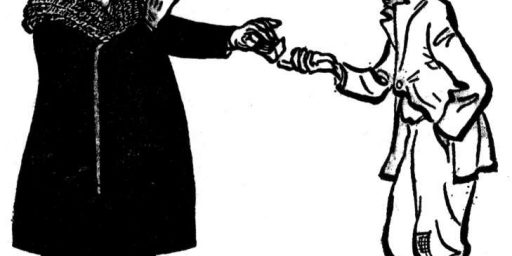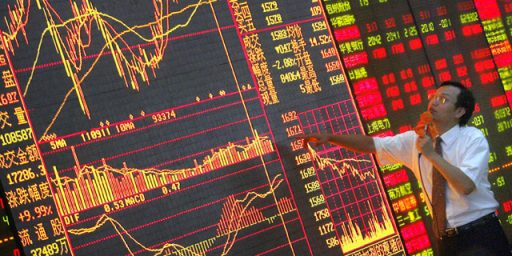Making Predictions Is Hard
especially about the future, as Niels Bohr once said (and was echoed by Yogi Berra). The National Intelligence Council has published its quintennial attempt to part the mists of the future and consider what the world might be like seventeen years hence in 2025. A good place to start taking a look at it might be the executive summary published at the Atlantic Council’s web site. There are links from there to our patron here, James Joyner’s, excellent commentaries on the report.
Unfortunately, I think James has been altogether too kind in his assessment of the report. Whatever the cost of preparing it might have been, it wasn’t worth it. I’m not the only one who thinks so. Here’s one incisive commentary:
Frankly, it’s not worth the hard drive space: India and China are rising (due to a “growing middle class”), as are non-state actors, continued growth will be a problem, catastrophic terror attacks are more likely, but terrorism can be solved with greater economic growth in the Middle East, Russia’s gonna be big too, “state capitalism” works. We’ll be powerful because of our focus on security and DoD and IC in 15 years too.
Tom Barnett is similarly unenthused:
Disappointing to see the NIC default to resource wars as a generalized bit of futures fear-mongering. It’s just so unimaginative and reflects the NIC talking to a lot of stale academics who trot out their analogies to 19th-century colonialism and balance-of-power politics while completely discounting the profound economic–and especially financial–interdependence (the latter currently on display big time).
Frankly, I think a better job could have been done by a half dozen reasonably well-informed graduate students over beer in a pub. I question the methodology of this report. To my eye the contributors lean altogether too heavily towards historians and political scientists (sorry, James) and far too lightly to hard scientists, engineers, and anthropologists. Here’s a sample bon mot from the report:
Leaders and their ideas matter. No history of the past hundred years can be told without delving into the roles and thinking of such leaders as Vladimir Lenin, Josef Stalin, Adolf Hitler or Mao Zedong. The actions of dominating leaders are the hardest element to anticipate. At several junctures in the 20th century, Western experts thought liberal and market ideas had triumphed. As demonstrated by the impacts of Churchill, Roosevelt, and Truman, leadership is key even in societies where institutions are strong and the maneuvering room for wielding personal power is more constrained
This idea goes gack to Thomas Carlyle. It’s the “Great Man” theory of history and I think it’s a load of bull. While individual historical figures, e. g. Julius Caesar, Napoleon, Mao, may bring color and texture to the fabric of history that fabric is formed by economics, demographics, and social structures. Gaius Julius Caesar might have elected never to cross the Rubicon into the precincts of Rome, fomenting the collapse of the Republic and the rise of the Empire. Rome would still have been expansionist and there would still have been an empire. Rome’s location, population, and way of life demanded it. We’d just have used some other word for monarch than Kaiser or tsar.
France was loaded for bear after the French Revolution. Even without Napoleon’s military genius it still would have spread the Revolution all over Europe. It might not have invaded Russia but it most certainly would have invaded Italy.
And so on. The ghastly thing about that pronouncement in this document is that it has nothing whatever to do with the meat of the document at all. Nowhere do the authors demonstrate how the choices of individual leaders will influence the world of 2025. If they’re saying that the world of 2025 is completely unpredictable because it will be so completely formed by the decisions of unpredictable leaders in that world they could have stopped this 120 page report at page 25.
There is a repeated confusion of absolute growth with relative growth. While emphasizing the significance of the latter they don’t seem to appreciate that it’s absolute power, strength, and wealth that’s important not relative power, strength, and wealth. China is powerful because of its enormous size not just because of its relative growth, however dramatic that might be. The U. S.’s continued absolute power, strength, and wealth despite the relative change in power, strength, and wealth insures U. S. pre-eminence for the foreseeable future, even with our present economic downturn. Were it otherwise Luxembourg would be the most important country in the world.
While they pay lip service to the importance of demographics, the authors don’t see to apprehend the implications of demographic forces in the case of individual countries. It is a fact that China’s work force will have begun to shrink by 2025 and it is likely that it will continue to shrink for decades following that. That means that even in the absence of other forces wages in China will be likely to rise, an important stressor on the economy of a country that has based its growth on being the low cost provider of labor, and significant stress will be placed on China’s military (the labor force competes with the military for the same people), China’s social institutions, and China’s government institutions. If there’s one thing that’s certain about China it’s that present facts render the persistence theory an extremely poor predictor of events in China over the next couple of decades and the persistence theory has overweening significance in this report.
If there’s one thing that Americans should have learned over the last six years, it’s that culture matters in how societies react to catastrophic events. The significance of culture is all but absent from the assessments in this report.
I’m sorely tempted to convene my own competitive colloquium on this subject. We could surely do a better job than this.





I think your misgivings are valid, Dave.
The problems you cite, though, are almost inevitable given the starting formulation that 1) required consensus and 2) was conducted and published under the imprimatur of the U.S. Government intelligence community.
The Great Man theory is wrong in the sense that there are underlying institutional and cultural factors that move things in a certain direction. But it’s not completely wrong, because when inflection points happen, it is the leadership that determines whether the event is a historical blip (because “nothing came of it”), a crisis no one could have controlled (think Buchanan prior to the Civil War) or a major change in history (as with Caesar). Without Caesar and Pompey and Crassus, Rome would have still been expansionist, but it would have been an expansionist Republic rather than an expansionist Empire.
No it wouldn’t. Rome was waiting for an emperor to claim her, and there were more than enough contenders for the throne. Caesar just got there first. Likewise Hitler and Napoleon. The “Great Man” theory is wrong because it assumes that the decisive actions come from the man, not the other way around.
As in any single sentence summation, this is too simplistic. Rome may have had an emperor, but when and how exactly it happened matter more than you credit. The personality and competencies/exceptionalities also matter more than you appear to credit. Germany between the wars was also looking for a strong nationalist leader, but they didn’t of social necessity need one that would attempt to exterminate the Jews and Gypsies.
The great man theory in isolation foolishly ignores the role of evolving social, political, and economic structures, but it is also foolish to ignore the role of ‘great men’ in shaping those structures.
Maybe not, but certainly there was a widespread public sentiment against Jews already, and certainly the annexation of Austria, re-occupation of the Rhineland, and the reclaiming of the Sudetenland would have happened under almost any other nationalist leader. Even the invasion of Poland would likely have happened so long as Stalin and his party were in power in Russia.
I didn’t. Re-read what I wrote. Leaders may swim in the river, float in the river or dam the river but they aren’t the river. Influence, yes; determine, no.
I didn’t mean to imply that you did. I just wanted to emphasize that neither extreme position was correct and that the truth lies in the middle.
I guess the question there is when does influence become determination or when does a difference in degree become a difference in kind?
The Jews and Rom would not likely have faired well in whatever strongman led government followed the Weimar Republic, but it was not just German social evolution that led to wholesale slaughter that was not even fully known by much of the populace. Any strongman would also likely have taken back the Sudetenland and at least some of the other contested territories. Whether that leader would have had the spectacular successes and equally spectacular failures of Hitler is an open question. I tend to find it unlikely, but it is of course all hypothetical.
I still think there are some Great Men without whom the very processes that create history would not have occurred.
Think of Mohammed. Assuming what we know about him is true (the historical parts, not the religious parts), then what would have happened had he not existed? You still might have gotten some religious leader coming out of Arabia, but he might have been not quite as driven, or as religious.
Think about it. If you don’t get Islamic Arabs coming out of Arabia, then the Persian Empire either doesn’t get conquered, or does so much more slowly. That gives the Byzantine Empire much more time to get through all the crap it was going through in the 7th century CE. You might still get Arab coalitions of tribes (they’d existed before), but they were generally much less long-lasting. That’s not just damming the river; that’d be shifting the entire river into a new bank, with major impersonal historical factors (like religion) missing.
No great men, eh?
Hmm…so if George Washington was killed during the Seven Years War, and its Benedict Arnold instead that takes the leading role during the Revolution everything works out more or less as we know it because economics, demographics and social structures remain more or less the same?
So, if Churchill’s was killed in Manhattan by a taxi (or died in the plane crash in 1919), and Halifax became PM, it would be economics etc. that determined the outcome of WWII?
Certainly, one can but too much emphasis on individual actors, but I think it is nonsense to say they only add “color and texture to the fabric of history”. In fact, all of the great (and not-so-great) systematic attempts to account for history using only “economics, demographics, and social structures” (if we can take that to include their philosophical underpinnings), have been dismal failures. Hegel, Marx, Lenin, Trotsky, Spengler, Hitler, and Toynbee all had a problem with the future following nothing like the course they predicted. Hegel might look at Napoleon and see “the spirit of the age” at work, but in reality it was Napoleon the man at work and he had no interest in Hegel’s theories.
It seems better to me to say economics, demographics and social structure provide the context within which historical actors function. That context in many important ways limits what actions are open to historical actors (in a variety of ways), but that is not the same thing as saying they determine them. Additionally, there are important actors who have the affect of changing the context they exist within, thereby opening up previously unknown or proscribed possibilities.
Societal change has four elements: the attitudes that make up the society and the institutions that embody those attitudes; the commonly-accepted boundaries of who and what is part of that society (“us” and “them”); the crisis that challenges the institution’s (or institutions’) ability to meet society’s needs; and the personalities then wielding influence. The first two make up the stream, as Dave would put it, and are basically what keeps things going on a stable and predictable course in between crises.
When the crisis comes, how it is handled depends on all of the other factors, and how they react. One of these is certainly the leadership, and if they react in such a way that it damps down the crisis, or turns it to advantage, in preserving and strengthening the cultural attitudes and institutions, then the crisis is in retrospect not seen as a particularly big deal, even if it was. If the leaders, instead, turn the crisis into a grab-all for themselves (as Caesar, et al, did; as Hitler did; as FDR did), then it can lead to massive social re-ordering. This isn’t always a bad thing. (FDR was, at worst, a mixed bag, and our Founding Fathers were a pretty good deal for everyone but the English.) Just as FDR turned the US far more towards socialism, reordered the economy and institutions of society, and essentially changed the American character in large part, an equally driven leader who looked towards libertarian ends (say, a Coolidge type) could have saved and restored American institutions of the time, and rebuilt American confidence, leading the 1929-1933 recession to stay as just that, a recession, albeit deeper than most. Instead, we had a progressive, and a bit of a megalomaniac (as witness his running for a FOURTH term when he knew he was dying!) who made massive changes to society. That was not foreordained.
So no, the great men are not the only influence on events, but they are a very, very major influence on events, as important as the cultural attitudes and institutions. Yes, sometimes, there are events that would arise no matter who was in place in leadership (in or out of government). Other times, though, those events arise because of who was in place in leadership.
Washington wasn’t a particularly gifted (or lucky) general, I’m sure Arnold would have performed just as well. I also doubt, given that the events proceeding Arnold’s treason wouldn’t have taken place, that he would have been any less patriotic than Washington. No matter really, as Lee would most likely have been in charge without Washington, not Arnold.
But there is no indication that Arnold understood the need to simply keep an army in the field the way Washington did. Arnold would have wanted to win the Revolution via “feats of arms,” and when that became less and less likely…who knows?
As for Lee, you are probably right, but there is always that chance.
page 67: “A terrorist use of a nuclear weapon or an escalating conflict between two nuclear powers,
such as India and Pakistan, would graphically demonstrate the danger of nuclear weapons”
No kidding?
Michael, Arnold’s wife was a Tory. That certainly had a great deal of influence. I suspect that even without being passed over, and even without the investigation into his debts, Arnold still would have been easy to turn. In fact, without the investigation into his debts, he might have turned quicker.
For the “great man theory” I would also point to George Washington and his decision not to create a dictatorship when he easily could have and was pressured to do so. Without Washington our democracy could have been quite different.
Okay, I’ll play along, suppose Churchill had died in 1919. That means Chamberlain has no pressure to move right, no vocally anti-Bolshevik behind British foreign policy. Maybe, then, the British take up Stalin’s offer to defend Czechoslovakia and thus don’t give Hitler any concessions at Munich.
Or later, again without an anti-Bolshevik around to scare Stalin, Ribbentrop goes back to Berlin empty handed and the Nazi invasion of Poland is halted by Russian forces.